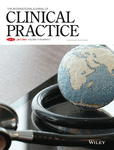Eosinopenia is a reliable marker of severe disease and unfavourable outcome in patients with COVID-19 pneumonia
Abstract
Background and Aim
Viral pneumonia is the most relevant clinical presentation of COVID-19 which may lead to severe acute respiratory syndrome and even death. Eosinopenia was often noticed in patients with COVID-19 pneumonia, but its role is poorly investigated. The aim of the present study was to investigate the characteristics and clinical outcomes of patients with COVID-19 pneumonia and eosinopenia.
Methods
We revised the records of consecutive patients with COVID-19 pneumonia admitted to our ER-COVID-19 area in order to compare clinical characteristics and outcomes of patients with and without eosinopenia. We considered the following clinical outcomes: 4-weeks survival; need for intensive respiratory support; and hospital discharge.
Results
Out of first 107 consecutive patients with pneumonia and a positive COVID-19 nasopharyngeal swab, 75 patients showed undetectable eosinophil count (absolute eosinopenia). At 4 weeks, 38 patients (38.4%) had required intensive respiratory treatment, 25 (23.4%) deceased and 42 (39.2%) were discharged. Compared with patients without absolute eosinopenia, patients with absolute eosinopenia showed higher need of intensive respiratory treatment (49.3% vs 13.3%, P < .001), higher mortality (30.6% vs 6.2%, P .006) and lower rate of hospital discharge (28% vs 65.6%, P < .001). Binary logistic regression analyses including neutrophil, lymphocyte, eosinophil, basophil and monocyte counts showed that absolute eosinopenia was an independent factor associated with 4-weeks mortality, need for intensive respiratory support and hospital discharge.
Conclusions
Absolute eosinopenia is associated with clinical outcomes in patients with COVID-19 pneumonia and might be used as a marker to discriminate patients with unfavourable prognosis.
DISCLOSURE
None of Authors has anything to disclose. We confirm that this manuscript has not been published elsewhere and is not under consideration by another journal.




